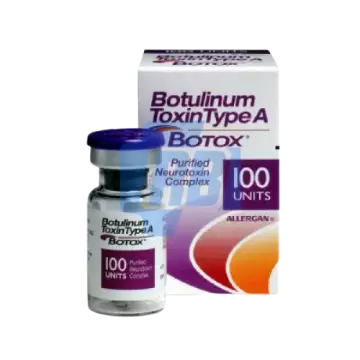Detailed Overview
WHAT IS IN BOTOX INJECTION?Each vial contains 100 units (U) of Clostridium botulinum toxin type A-haemagglutin complex as the active ingredient. It also contains human albumin and sodium chloride. WHAT IT LOOKS LIKE:The injection is supplied as a sterile white vacuum-dried powder in a clear glass vial. It is diluted before use with sterile 0.9% sodium chloride injection. HOW BOTOX INJECTION WORKS: BOTOX works by temporarily relaxing overactive or spastic (contracting) muscles. BOTOX can also block signals to the sweat glands thus reducing excessive sweating (hyperhidrosis), and can also block the release of chemicals in the brain associated with the cause of pain (chronic migraine). IT IS USED TO TREAT MEDICAL CONDITIONS ASSOCIATED WITH OVERACTIVE MUSCLES:causing excessive eyelid blinking (blepharospasm) in patients twelve years and overof the face (hemifacial spasm and VIIth nerve disorders)causing 'lazy eye' or squint (strabismus) in children and adultsin the throat, causing a strained, strangled sounding voice or breathy voice with voice loss (spasmodic dysphonia)causing the head to be in an unusual posture or pain in the neck associated with twisting of the head (cervical dystonia)in children aged two years and older, causing altered and unnatural position or movements in the hand and arm as well as legs, including those muscles that cause abnormal ankle position and walking gait (juvenile cerebral palsy)in adults, causing focal spasticity in the hands, arms or legs (adult focal spasticity).BOTOX IS ALSO USED:to treat headaches occurring in adults with chronic migraineto treat excessive sweating from the armpit areato improve the look of vertical frown lines that appear between the eyebrows, lines around the eyes and on the forehead. SIDE EFFECTS:All medicines can have side effects. Sometimes they are serious, most of the time they are not. Some patients may experience unwanted effects with BOTOX treatment, and may need further medical treatment. Ask your doctor to answer any questions you may have. If while undergoing treatment with BOTOX injection you experience any side-effects or symptoms which may be due to this medication (whether or not it is mentioned below) please inform your Doctor as early as possible. This product contains albumin, an extract of human blood. Based on effective donor screening and product manufacturing processes, it carries an extremely remote risk for transmission of viral diseases. A theoretical risk for transmission of Creutzfeldt-Jakob disease (CJD) also is considered extremely remote. No cases of transmission of viral diseases or CJD have ever been identified for albumin. THINGS WHICH MAY OCCUR GENERALPain, tenderness, inflammation, tingling or numbness, swelling, redness of the skin, infection, bleeding and/or bruising at the site of injection; generally feeling unwell and weakness. The following symptoms have been reported on rare occasions: changes in the way the heart beats, chest pain, skin rash and allergic reaction (symptoms: shortness of breath, wheezing or difficulty breathing; swelling of the face, lips, tongue or other parts of the body; rash, itching or hives on the skin). In some cases, the effect of botulinum toxin may be observed beyond the site of injection and the following symptoms may occur: loss of strength and muscle weaknessdrooping of the upper eyeliddouble or blurred visiontrouble speaking or saying words clearlyconstipationaspiration pneumonia (serious lung infection)trouble swallowing or breathing, which can be life-threatening. These symptoms can happen hours to weeks after injection and are more likely to occur in patients treated with high doses or who have underlying conditions that would predispose them to these symptoms. Tell your doctor immediately or go to Accident and Emergency at your nearest hospital if you experience any of the above symptoms. BLEPHAROSPASM, HEMIFACIAL SPASM OR VIITH NERVE DISORDERS Drooping of the eyelids, irritation or tearing, dry eye, not being able to close the eye, sensitivity to light, dizziness and tiredness. Less commonly, inward or outward turning of the eye, inflammation of the eye, double vision, and swelling of the eyelid skin lasting several days. STRABISMUSDrooping of the eyelids, vertical turning of the eye, double vision, bleeding beneath the eye lids and at the front of the eye. Less commonly, bleeding behind the eye ball, piercing of the sclera (the tough skin BOTOX® Botulinum Toxin Type A- CMI Version 3.0 PAGE 6 OF 7 covering part of the eye bulb), dilation of the pupil, loss of awareness of space and past pointing (the inability to place a finger on another part of the body accurately), headache, inability to focus, dizziness, discomfort/irritation of the eye, increased pressure in the eye. SPASTICITY IN CHILDREN TWO YEARS AND OLDERFalling, clumsiness, leg pain, weakness of the leg, localised and generalised muscle weakness. Less commonly, leg cramps, fever and knee or ankle pain, increased frequency of passing urine, joint dislocation and muscle spasms. FOCAL SPASTICITY IN ADULTSMost side effects that have been reported in patients being treated for focal spasticity were mild to moderate and got better without needing medical attention. Side effects reported include: pain in the affected limb, changes in ease of movement of the muscle, increased sensitivity to touch or pain and headache. Less common side effects include: weakness or a loss of energy, joint pain, skin problems, nausea, 'pins & needles', itching and lack of coordination. CERVICAL DYSTONIASoreness or bruising where the injection was given, difficulty in swallowing, neck pain, weakness of the neck, and less commonly, general weakness. Side effects, if they occur, tend to appear in the first week after injection, and last about two weeks. However, in rare instances, patients may have difficulty in swallowing that could persist for longer than two weeks after injection and may develop into a more serious condition. Make sure you tell your doctor if you experience any difficulty in swallowing. SPASMODIC DYSPHONIABreathiness, difficulty in swallowing, inhalation of fluid or food particles from the stomach, narrowed air passages causing a harsh sound in breathing and pain were among the more common side effects reported in clinical trials. CHRONIC MIGRAINELoss of movement on the face, drooping of the eyelids, skin rash, itching, pain at the injection site, neck pain, muscle pain, tenderness or weakness, muscle spasms or tightness. Less commonly, pain of skin, pain of jaw and difficulty in swallowing. Headache, including worsening migraine, has been also reported, usually occurring within the first month after treatment; however, these reactions did not always reoccur with following treatments and the overall incidence decreased with repeated treatments. PRIMARY HYPERHIDROSISIncrease in sweating in other areas of the body and pain at the injection site. FROWN LINES Drooping of the eyelids, headache, face pain, redness, swelling at the injection site, bruising, skin tightness, muscle weakness, numbness or a feeling of pins and needles or nausea were among the more common effects reported in clinical trials. CROW'S FEETBruising at the injection site, headache and flu-like symptoms. FOREHEAD LINES Headache, bruising, drooping of the eyebrows, eyelid swelling, aching/itching forehead, nausea, feeling of tension and flu-like symptoms.
 Back Soon
Back Soon






